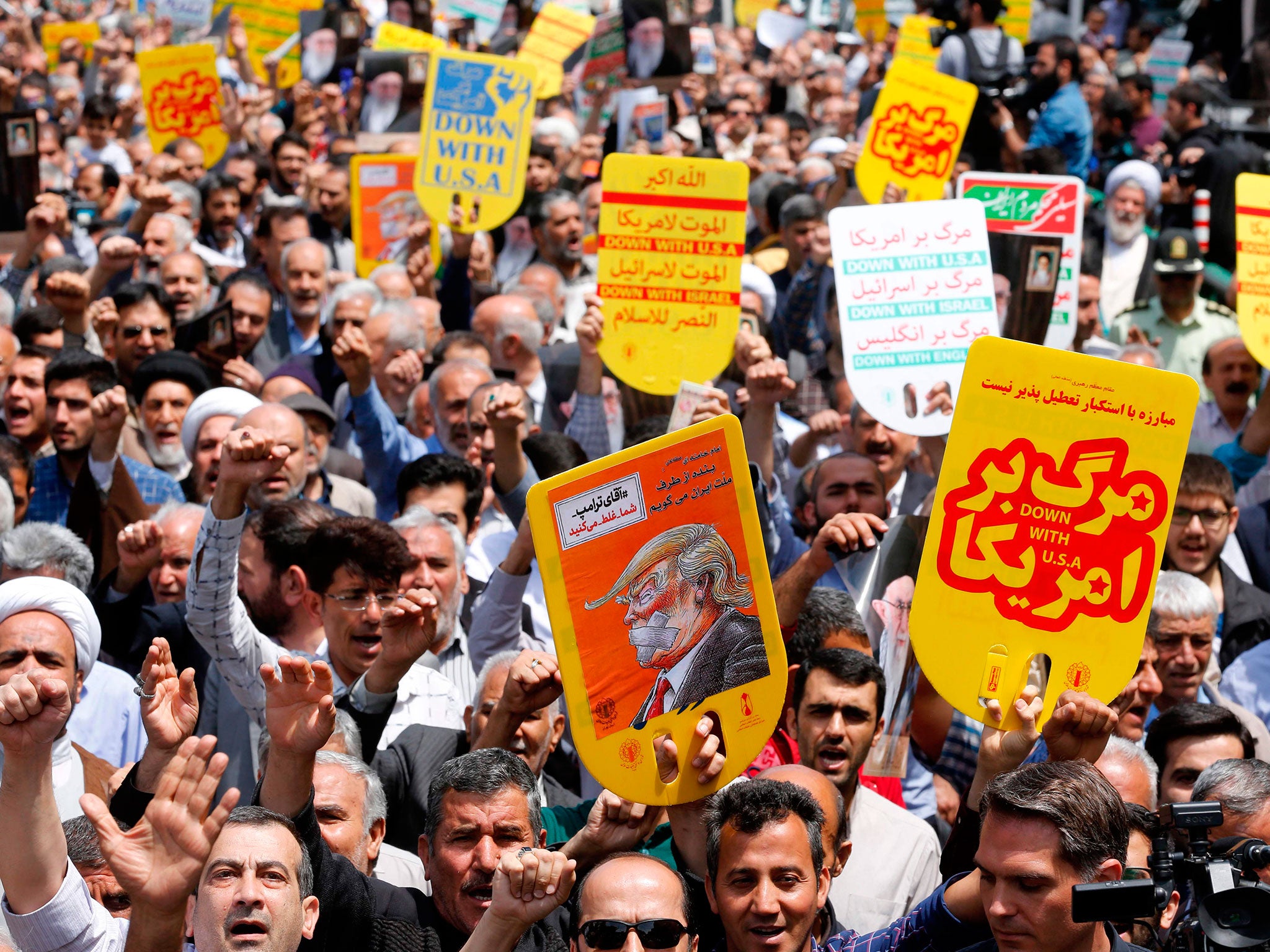Thousands of Iranians protest Trump's withdrawal from nuclear deal as Europeans try to keep it alive
Israeli defense minister says country is not looking for 'friction' but Syria has to get rid of President Bashar al-Assad

Thousands of Iranians took to the streets across the country on Friday to protest against US President Donald Trump's decision to pull out of the nuclear deal with world powers, as Germany, France and Britain reaffirmed their commitment to the deal.
The protests resembled other aggressive but orderly gatherings typical under President Hassan Rouhani, who has tried for a rapprochement with the West.
But while slogans of "Death to America" were few, many Iranians are sincerely angry over Mr Trump's decision and are siding with hard-liners who have warned to be suspicious of the West.
Mr Trump pulled the US out of the 2015 accord on Tuesday.
The next evening, Israel attacked dozens of suspected Iranian targets in Syria in overnight strikes this week that it said were in response to an Iranian rocket barrage. It was the most serious military confrontation between the two bitter enemies to date. The cross-border exchange gave way to a war of words.
UN Secretary-General Antonio Guterres called late Thursday for an immediate halt to "all hostile acts" to avoid "a new conflagration" in the Middle East.
Israel's defense minister Friday called on President Bashar Assad to "get rid" of Iranian forces in Syria, warning their continued presence would only cause trouble.
Speaking while touring the Israeli side of the occupied Golan Heights, Defense Minister Avigdor Lieberman said Israel is not looking for friction. "We did not come to the Iranian border, they came here," he said.
"I will take this opportunity to send a message to Assad: Get rid of the Iranians, get rid of Qasem Soleimani, and the Quds Force, they are not helping you, they only cause damage, and their presence will only cause problems and damages" Lieberman said. Soleimani is the head of the Iranian Revolutionary Guard's elite Quds expeditionary force which is fighting in both Iraq and Syria.
"Get rid of the Iranians and maybe it will be possible to have a different kind of life," Lieberman added.
Iran, meanwhile, in its first official reaction to the Israeli attacks on suspected Iranian targets in Syria, said Damascus has the legitimate right to respond to what it said were repeated violations of the country's sovereignty "under fabricated and baseless excuses."

Iran's Foreign Ministry spokesman Braham Ghasemi added that the international silence in the face of such "aggressive moves" is in effect a "green light" to more such attacks.
Iran has advisers and experts and has backed tens of thousands of militiamen who are fighting alongside Assad forces in the civil war. Israel has warned it will not tolerate its archenemy Iran establishing a military presence on its doorstep.
In Tehran, senior cleric Ayatollah Ahmad Khatami said the Western pressure will backfire, threatening that Israel will pay the price.
"The holy system of Islamic Republic will step up its missile capabilities day by day so that Israel, this occupying regime, will become sleepless and the nightmare will constantly haunt it that if it does anything foolish, we will raze Tel Aviv and Haifa to the ground," the hard-line cleric said during Friday sermons. The worshippers chanted: "Death to America," and "Death to Israel".
Germany, France and Britain have reaffirmed their commitment to the Iran deal but, in a bid to bring Washington back into it, want talks to be held with Rouhani's government in a broader format covering Iran's ballistic missile programme and its role in Middle Eastern conflicts, including in Syria and Yemen.
Rouhani and his ministers have sought to reassure Iranians that their oil-reliant economy can withstand a return to pressures sure to follow Trump’s rejection of the deal clinched under his predecessor Barack Obama after years of negotiations.
The top diplomats of Iran, France, Britain and Germany are expected to meet early next week to discuss their next steps.
French foreign minister Jean-Yves Le Drian stressed the importance of protecting Israel's security but urged a "new path" of negotiations with Iran to calm tensions.
Later, it emerged Russian President Vladimir Putin and German Chancellor Angela Merkel have discussed efforts to preserve the Iran nuclear deal and prevent an escalation of tensions in the Middle East.
Ms Merkel's office said she spoke to Mr Putin by phone on Friday, a week before the German leader travels to Sochi to meet the Russian president.
It said they underlined their aim of preserving the Iran deal after the United States' withdrawal, and that both expressed concern about recent developments in the region.
European countries should continue trading with Iran despite Trump's decision to re-impose sanctions, France's finance minister has said.
Bruno Le Maire said Europe should not act as "vassals" to the US or accept that it is the "world's economic policeman".
He told Europe-1 radio he wants to create a European body that would have the same kind of powers the US Justice Department has to punish foreign companies for their trade practices.
Join our commenting forum
Join thought-provoking conversations, follow other Independent readers and see their replies
Comments
Bookmark popover
Removed from bookmarks